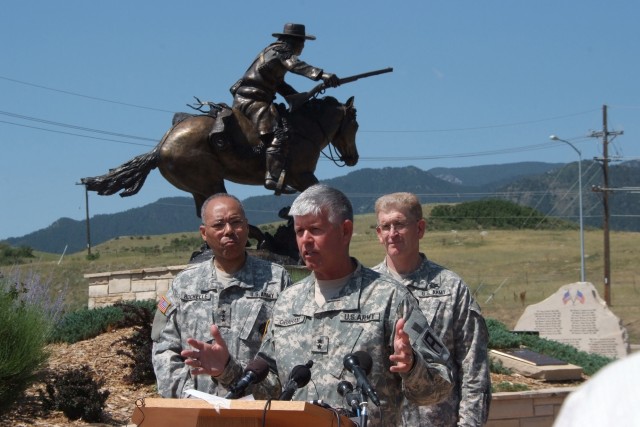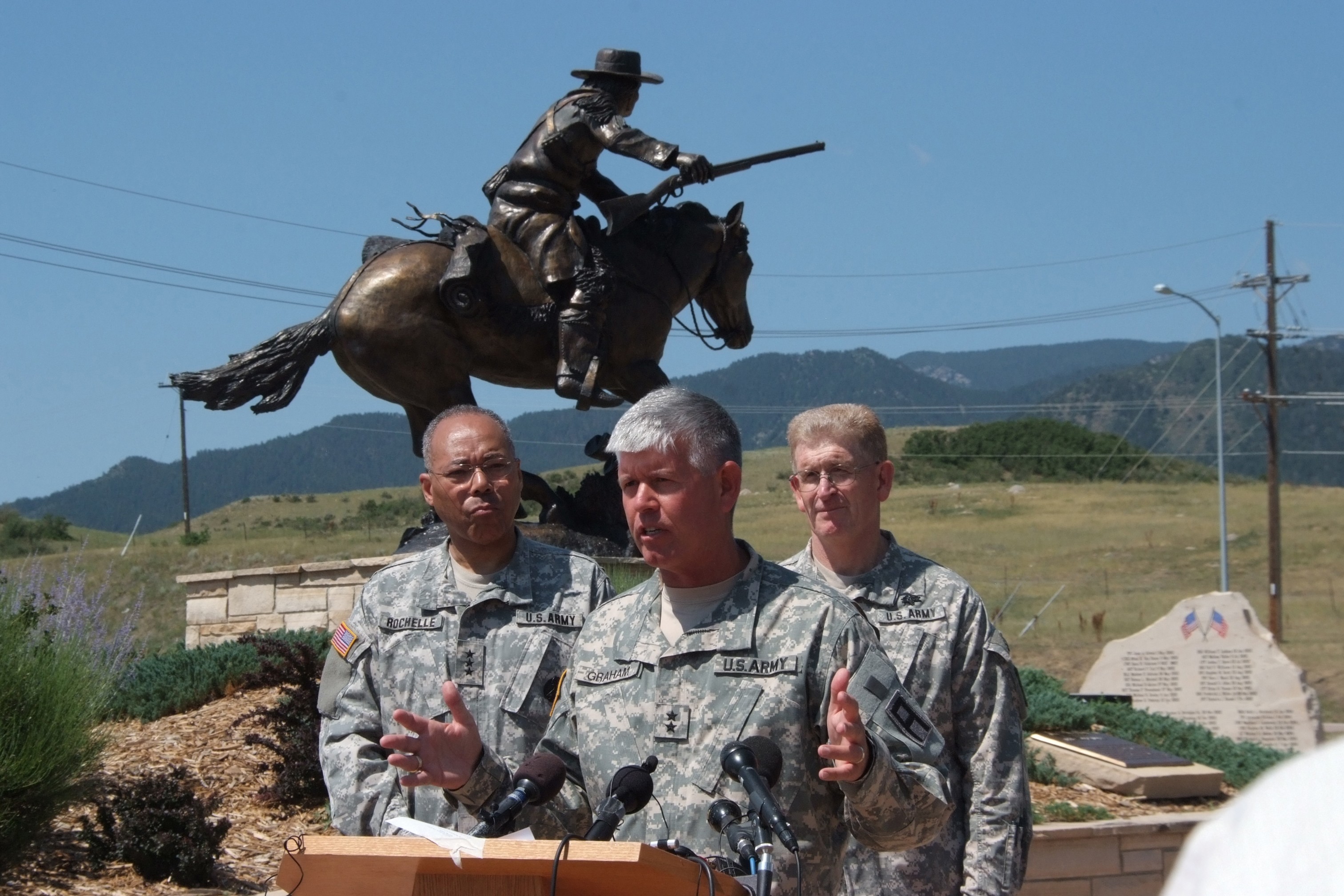
FORT CARSON, Colo. (July 16, 2009) - There was not a single factor or grouping of contributing factors that explain the clustering of violent crimes dating back to 2005 involving Fort Carson Soldiers, the Army surgeon general said July 15.
Lt. Gen. Eric Schoomaker said the epidemiological consultation, or EPICON study, concluded that the answers rest somewhere in the synchronicity of several factors including unresolved problems of individuals, the roles of leaders and the number of deployments and the intensity of combat experiences in units.
The findings of an in-depth study that delved into the 14 Fort Carson Soldiers alleged to have been involved in homicides from 2005-2008 were released during a press conference at Fort Carson. Lt. Gen. Michael Rochelle, Army deputy chief of staff for personnel, G-1, and Maj. Gen. Mark A. Graham, commanding general, Division West (First Army) and Fort Carson, joined Schoomaker at the event.
Graham requested the EPICON study in October 2008.
"The goal was to not only study the rates and trends of violent deaths, but to clearly identify all risk factors, assess the adequacy of behavioral health programs, and to develop strategies to enhance our resources and support with our ultimate goal to reduce incidences of violent death," he said.
"We would all like to look back at a cluster of misconduct and criminal activities that resulted in devastating human tragedies here in Colorado and be able to say this is the reason they happened, and we know exactly what could have been done to prevent them," Schoomaker said. "But that's rarely the way things work when dealing with human behavior and not what we learned through this epidemiologic consultation study."
He said the EPICON team looked at several risk factors relevant to individual Soldiers and families to include the number of deployments, law violations and enlistment medical waivers granted at enlistment, and alcohol and drug issues.
"While we don't know what caused this cluster of criminal behavior and misconduct in one unit, we do know that we need to look more closely at individuals, at units and the environments and communities where our Soldiers work and live," Schoomaker said.
The study dismissed enlistment waivers as common threads among the Soldiers involved in violent crimes. When it came to enlistment waivers, he noted only three of the accused Soldiers enlisted with conduct waivers. The study noted two of the 14 Soldiers involved had never deployed.
Rochelle said the Army has to do more to build Soldiers' resiliency. He said Army research and studies, along with its partnerships with the National Institute of Mental Health and the University of Pennsylvania, have shown the service needs to conduct an assessment of every Soldier's resiliency, starting with when they raise their right hand and take the oath of enlistment.
He said the Army will spend $84 million in 2010 and another $116.9 million in 2011 to improve Soldier resiliency. In addition, the service will spend $15 million on the Comprehensive Soldier Fitness Program that will place 900 noncommissioned officers trained in building resilience at the University of Pennsylvania inside Army units.
Rochelle compares master resiliency trainers to Army master fitness trainers who, he said, are physical training experts who help Soldiers build up their physical fitness.
"These resiliency NCOs will work the same magic on (our Soldiers') resiliency," Rochelle said.
Graham noted the EPICON team provided three in-progress reviews, allowing Fort Carson leadership to implement changes - such as mobile behavior health teams - while the study was still in progress. These teams consist of 14 psychologists, psychiatrists and other medical professionals who set up shop within a unit's footprint during pre- and post-deployment processing. In addition to helping the Soldiers get care, having the teams located in the unit's footprint helps reduce the stigma associated with getting help, Graham said.
Military family life consultants - counselors available to listen to Soldiers - are another initiative started at Fort Carson that has received an amazing response, he said. A recent unit return from Iraq proved that four consultants were not enough. Now, as part of the Fort Carson Reintegration Plus program, 20 military life consultants provide assistance to the units after they return to Fort Carson.
Another recent change at the Mountain Post is the addition of resiliency and mental toughness training for Soldiers prior to and after completion of deployments.
"Soldiers will tell you it (this training) helps them to know when their anxiety levels are up," Graham said, "and when they get off a mission they need some skills to learn to fall back on to help them come back down. And this training helps them do it."
Graham reminded the media that the 14 Soldiers identified as being involved in a violent crime are not representative of the Army population of more than 1.1 million Soldiers.
"The overwhelming majority of our Soldiers are doing very well. We have outstanding Soldiers who are well-led, disciplined, fit and well-trained," Graham said. "The Soldiers are fighting our nation's wars in a time of an all-volunteer force. This speaks volumes for our next generation and I am confident they will be a strong part of the core of our country in the future."
(Devin Fisher writes for the Fort Carson Mountaineer newspaper.)

Social Sharing